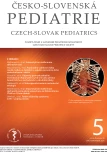-
Medical journals
- Career
Bulky gastroduodenal trichobezoar (Rapunzel syndrome) causing abdominal pain and anorexia in a nine-year-old female
Authors: M. Geryk 1; E. Karásková 1; T. Malý 2; M. Velgáňová-Véghová 1; B. Ludíková 1; J. Čivrný 3; J. Volejníková 1,4
Authors‘ workplace: Dětská klinika, Lékařská fakulta Univerzity Palackého a Fakultní nemocnice, Olomouc 1; I. chirurgická klinika, Lékařská fakulta Univerzity Palackého a Fakultní nemocnice, Olomouc 2; Radiologická klinika, Lékařská fakulta Univerzity Palackého a Fakultní nemocnice, Olomouc 3; Institut molekulární a translační medicíny Univerzity Palackého, Olomouc 4
Published in: Čes-slov Pediat 2021; 76 (5): 257-261.
Category: Case Report
Overview
Here we present a case of a nine-year old female admitted due to nonspecific abdominal pain and anorexia (specifically, rejecting solid food). History of a long-term psychological burden was reported, leading to trichotillophagia and a presence of hair in the stool. On physical examination, palpable bulky resistance located in the epigastrium was revealed. Gastroscopy identified a large rigid trichobezoar in the stomach, extending down to the duodenal bulb. Due to its size, endoscopic removal of the hairball was not possible and a laparotomy-gastrotomy with extraction of a cast trichobezoar was performed, followed by revision of the small intestine. Approximately 6 months after the surgery, the patient was diagnosed with chronic gastritis and required antibiotic eradication of Helicobacter pylori. Continuous psychological and psychiatric care improved the overall condition of the patient and prevented the recurrence of trichotillophagia. This case report is aimed to highlight the possibility of bezoar as an extremely rare cause of abdominal pain in children, thus complementing its broad differential diagnosis.
Keywords:
Abdominal pain – children – anorexia – gastrotomy – Rapunzel syndrome – trichobezoar (hairball) – trichotillophagia
Sources
1. Khan S, Jiang K, Zhu LP, et al. Upper gastrointestinal manifestation of bezoars and the etiological factors: A literature review. Gastroenterol Res Pract 2019; 5698532.
2. Gelrud D, Guelrud M. Gastric bezoars. https://www.uptodate. com/contents/gastric-bezoars.
3. Naik S, Gupta V, Naik S, et al. Rapunzel syndrome reviewed and redefined. Dig Surg 2007; 24 (3): 157–161.
4. Grant JE, Odlaug BL. Clinical characteristics of trichotillomania with trichophagia. Compr Psychiatry 2008; 49 (6): 579–584.
5. Vaughan ED Jr, Sawyers JL, Scott HW Jr, et al. The Rapunzel syndrome. An unusual complication of intestinal bezoar. Surgery 1968; 63 (2): 339–343.
6. Liu LN, Wang L, Jia SJ, et al. Clinical features, risk factors, and endoscopic treatment of bezoars: A retrospective analysis from a single center in Northern China. Med Sci Monit 2020; 26: e926539.
7. Chahine E, Baghdady R, El Kary N, et al. Surgical treatment of gastric outlet obstruction from a large trichobezoar: A case report. Int J Surg Case Rep 2019; 57 : 183–185.
8. Ahmed N, Baloch MA, Baber KM, et al. A rare variant of rapunzel syndrome-acute small bowel obstruction caused by ball of hairs in distal ileum with its tail extending in caecum and ascending colon. J Pak Med Assoc 2016; 66 (6): 761–764.
9. Kaspar A, Deeg KH, Schmidt K, et al. Rapunzel syndrome, an rare form of intestinal trichobezoars. Klin Padiatr 1999; 211 (5): 420–422.
10. Ahmad Z, Sharma A, Ahmed M, et al. Trichobezoar causing gastric perforation: A case report. Iran J Med Sci 2016; 41 (1): 67–70.
11. Klipfel AA, Kessler E, Schein M. Rapunzel syndrome causing gastric emphysema and small bowel obstruction. Surgery 2003; 133 (1): 120–121.
12. Gonuguntla V, Joshi DD. Rapunzel syndrome: A comprehensive review of an unusual case of trichobezoar. Clin Med Res 2009; 7 (3): 99–102.
13. Bickle I, Namdev R, et al. Rapunzel syndrome. https://radiopaedia. org/articles/rapunzel-syndrome.
14. McCracken S, Jongeward R, Silver TM, et al. Gastric trichobezoar, sonographic findings. Radiology 1986; 161 (1): 123.
15. Wang PY, Wang X, Zhang L, et al. Bezoar-induced small bowel obstruction: Clinical characteristics and diagnostic value of multi-slice spiral computed tomography. World J Gastroenterol 2015; 21 (33): 9774–9784.
16. Wang YG, Seitz U, Li ZL, et al. Endoscopic management of huge bezoars. Endoscopy 1998; 30 (4): 371–374.
17. Ertuğrul G, Coşkun M, Sevinç M. Treatment of gastric phytobezoars with Coca-Cola® given via oral route: a case report. Int J Gen Med 2012; 5 : 157–161.
18. Komaki Y, Kanmura S, Tanaka A. Cola dissolution therapy via ileus tube was effective for ileus secondary to small bowel obstruction induced by an enterolith. Intern Med 2019; 58 (17): 2473–2478.
Labels
Neonatology Paediatrics General practitioner for children and adolescents
Article was published inCzech-Slovak Pediatrics

2021 Issue 5-
All articles in this issue
- Congenital pulmonary airway malformation
- Postpartum mother-infant bonding from the aspect of preventing child maltreatment
- Bulky gastroduodenal trichobezoar (Rapunzel syndrome) causing abdominal pain and anorexia in a nine-year-old female
- Iron deficiency anemia caused by malnutrition – case report
- Congenital pulmonary airway malformation and pulmonary sequestration – 15 years of experience at the Department of Pediatrics, University Hospital in Hradec Králové
- The fatal consequences of CAN syndrome – scoping review
- Rozloučení s naším milovaným primářem
- Kniha: Předčasně narozené dítě
- Podíl českých dětských chirurgů na globální studii o přežití dětí s vrozenými vývojovými vadami
- Czech-Slovak Pediatrics
- Journal archive
- Current issue
- Online only
- About the journal
Most read in this issue- Congenital pulmonary airway malformation
- Iron deficiency anemia caused by malnutrition – case report
- Bulky gastroduodenal trichobezoar (Rapunzel syndrome) causing abdominal pain and anorexia in a nine-year-old female
- Congenital pulmonary airway malformation and pulmonary sequestration – 15 years of experience at the Department of Pediatrics, University Hospital in Hradec Králové
Login#ADS_BOTTOM_SCRIPTS#Forgotten passwordEnter the email address that you registered with. We will send you instructions on how to set a new password.
- Career

